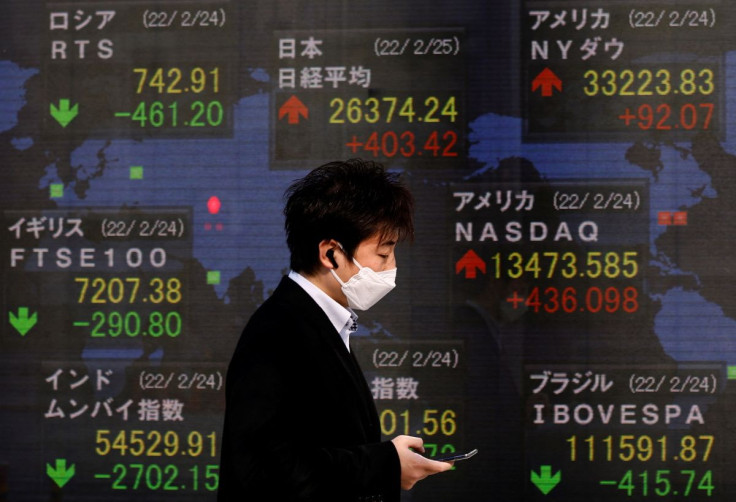Stocks, Bonds Rally Before Fed Meet, ECB Move Buoys Mood

Global shares and government bonds rallied on Wednesday ahead of what is expected to be the largest U.S. interest rate rise since 1994, as investors cast aside fears of slowing economic growth and instead looked for bargains among beaten-down stocks.
Investor mood was also buoyed by a surprise announcement from the European Central Bank (ECB) that it will work to avoid a debt crisis due to rising borrowing costs by supporting high-debt member states and devising a new tool to manage the risks.
Though some investors thought the ECB's proposed measures were not bold enough, European shares jumped, and government bond yields in countries such as Italy, Spain and Portugal - which will benefit from the ECB's plans - pulled back.
By late morning in New York, the Dow Jones Industrial Average had risen 0.64%, the S&P 500 gained 0.95%, and the Nasdaq Composite jumped 1.5%.
MSCI's gauge of stocks across the globe also leapt 0.70%.
Markets are expecting the Federal Reserve, which concludes its two-day policy meeting on Wednesday, to announce at 2 p.m. EDT (1800 GMT) that it will raise its short-term policy rate by 75 basis points to a range of 1.50% to 1.75%.
"All eyes on the Fed in what has been a crazy shift across asset classes this week," analysts at TD Securities said in a note to clients, adding that it expects rates to be raised by 75 basis points on Wednesday.
"We also expect the Fed to tighten policy by 75bp in July and then, after reaching neutral, to slow the pace to 50bp in September and November," the analysts said.
Investor demand for risk tempered bids for government bonds. The yield on benchmark 10-year Treasuries eased to 3.4098%, and the yield on two-year Treasuries also pulled back to 3.3459%, after touching the highest since 2007 at 3.456% overnight. [US/]
Given many U.S. borrowing rates are linked to yields, financial conditions have already tightened markedly there even before the Fed hikes.
Lower Treasury yields did not curb demand for the dollar, however. The dollar index rose 0.18%, weighing somewhat on the euro, which was down 0.21% at $1.0392. The euro had risen as much as 0.3% when news broke that ECB was holding an unscheduled meeting to discuss the recent bond market sell-off.
Italy's 10-year bond yield, which stands to benefit the most from the ECB's plans, was last down at 3.91%, above its session low of around 3.87%. Spanish and Portuguese 10-year yields also came off their day's lows but were still sharply down on the day..
"I think essentially it is the bare minimum of what could be expected, but I also believe it's the most realistic outcome of what they could compromise (on) today," Piet Christiansen, chief analyst at Danske Bank in Copenhagen, said of the ECB's announcement.
Still, the ECB's move allowed bond markets everywhere to rally after their recent hammering, with German Bund yields swooping down to 1.67% and 10-year Treasury yields dropping to 3.37% from Tuesday's peak of 3.498%.
ECB chief Christine Lagarde is due to speak in London at 1620 GMT. It is almost a decade since her predecessor Mario Draghi did the same at the height of the euro zone debt crisis.
"I think Lagarde will try to do 'whatever it takes' 2.0 tonight" Lorenzo Codogno founder of LC Macro Advisers, said describing the current situation as a perfect storm. "But the markets won't be happy if she comes empty-handed."
INFLATION FEARS
The worries about rising borrowing costs and global inflation have been hammering financial markets all year.
World stocks are down over 20%, bond markets have been routed and fears that drastic Fed action could tip the world into recession means the U.S. central bank's moves later will be crucial for traders.
Treasury yields had hit decade highs overnight and the dollar a 20-year peak as futures implied it was near-certain the Fed would hike by 75 basis points to a range of 1.50-1.75%.
That would be the biggest increase since 1994, and markets already have rates reaching an eye-watering 3.75-4.0% by the end of the year.
"Against a backdrop of sky-high inflation, rising rates, and growing recession concerns, the S&P 500 has had its worst start to the year since 1962," analysts at Goldman Sachs said.
"A likely coming peak in inflation is probably not sufficient to see the bottom..."
They recommended that investors reduce portfolio duration and increase exposure to real assets.
MSCI's broadest index of Asia-Pacific shares outside Japan was closing almost flat, but is down sharply on the week.
Japan's Nikkei lost 1.1%, though sentiment was helped by a survey showing an improvement in confidence among Japanese manufacturers.
Chinese shares bucked the trend with a gain of 1.3%. Data on Chinese retail sales and industrial output for May were a little better than forecast, but still showed the drag from coronavirus lockdowns.
Authorities in Beijing said on Tuesday the city was in a "race against time" to get to grips with its most serious outbreak since the pandemic began.
Wednesday's pull-back in yields gave gold, which has taken a hammering from inflation and a sky-high dollar, a respite. It jumped 0.7% to $1,820.86 an ounce. [GOL/]
Oil prices stumbled after the Organization of the Petroleum Exporting Countries (OPEC) stuck to its forecast that world oil demand will exceed pre-pandemic levels in 2022. [O/R]
Brent was almost a dollar softer at $120.75, while U.S. crude dipped $1.23 cents to $118.1 per barrel.
© Copyright Thomson Reuters 2024. All rights reserved.





















